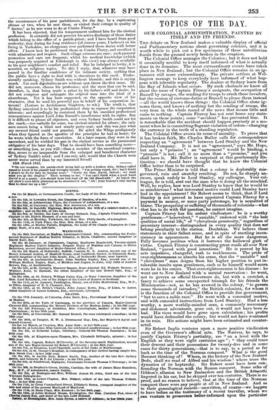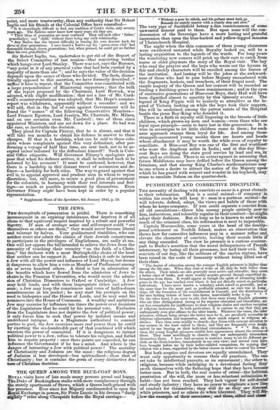TOPICS OF THE DAY.
OUR COLONIAL ADMINISTRATION, PAINTED BY ITSELF AND ITS FRIENDS.
THE debate on New Zealand makes a valuable display of official and Parliamentary notions about governing colonies, and it is worth while to pick out a few specimens of these antediluvian fossils from the ground newly broken in the eruption.
The Colonial Office manages the Colonies ; but it does not hold it essentially needful to keep itself informed of what is actually done in its domains. The most extraordinary events have taken place in New Zealand ; but the Colonial Office remains in an ig- norance still more extraordinary. The private settlers at Wel- ling-ton manage to keep everybody here informed of what hap- pens with tolerable regularity. The dealers at Sydney learn from the Bay of Islands what occurs. By such channels we know all about the issue of Captain Fitzroy's assignats, the occupation of Russell by savages, the sending for troops to crush those invaders, but the cession of customs-duties at Russell to please them instead —all the world knows these things : the Colonial Office alone ig- nores them, and knows of nothing but the sending of troops, the very item in the whole round of the news that means little and came to nothing. Captain Fitzroy has not sent home any state- ments on these points ; some " accident " has prevented him. It is remarkable that the accident should happen precisely at a mo- ment when he is committing flagrant violation of orders—changing the currency in the teeth of a standing regulation. The Colonial Office avows its sense of morality. To prove that it has broken faith, Mr. Charles Buller calls for correspondence respecting. an " agreement " between Lord Stanley and the New
Zealand Company. It is not an "agreement," says Mr. Hope, but only a 'promise " ; an "agreement" would be binding, a
"promise" is not; call it no more than a "promise," and you shall have it. Mr. Buller is surprised at this gentlemanly dis- tinction : we should have thought that he knew the Colonial Office better than to be surprised.
The Prime Minister is told that a colony is deplorably mis- governed, ruin and anarchy resulting. Do not, he sharply an-
swers, speak rudely to Lord Stanley, my colleague. Your col- league, he is told, sent out the man who is doing all the mischief. Well, he replies, how was Lord Stanley to know that he would be so mischievous ? what interested motive could Lord Stanley have had in the appointment/ Sir Robert seems to think, that if Lord Stanley is not proved to have appointed Captain Fitzroy for a payment in money, or some party patronage, he is acquitted of blame. The prospering or suffering of thousands of colonists—what that has to do with th& question, he cannot imagine. Captain Fitzroy has his ardent vindicators : he is a worthy gentleman—" benevolent," " amiable," endowed with " the best qualities of social life," of "chivalrous generosity," regardless of
pecuniary interest=distinguished in every quality that does not belong peculiarly to the station. Doubtless. We believe these
statements in their fullest sense, and in spite of startling incon- sistency in appearances. But he is all the more dangerous. Folly becomes perilous when it borrows the hallowed garb of virtue. Captain Fitzroy is constructing great roads all over New
Zealand, "paved with good intentions." He is proved by his acts impulsive, changeful, rash .to recklessness. The pride of
over-righteousness so absorbs his sense, that the " amiable " and " chivalrous " man deigns from his higher position to put in- tolerable insults upon gentlemen, such as he himself would scorn were he in his senses. That over-righteousness is his disease : he went out to New Zealand with ' a mental reservation : he went, not to govern as official Governors do, but with a crotchet, a fancy to achieve some unexpected triumph for his friends the Missionaries—not, as he has avowed in the colony, "to govern some thousands of intruders," the British colonists, for whom it is the function of the Colonial Office to provide due government, "but to save a noble race." He went with a concealed motive, and with concealed instructions from Lord Stanley. Had a less worthy, a more worldly-minded man, a commonly mercenary and dishonest adventurer, gone out, it would not have been so bad. His vices would have gone upon calculation ; his profits would have defrauded the colony, but would not have wantoned in its ruin. His actions might have been estimated and counter- acted.
Sir Robert Inglis ventures upon a more positive vindication even of the Governor's official acts. The Natives, he says, to justify Captain Fitzroy's partiality, are " on a level with the English as they were eight centuries ago "; " they could trace their descent and their possessions for twenty-five and in some
cases for thirty generations,—that is to say, to a period as far back as the time of the Norman conquest." What is the good Baronet thinking of ? Where, in the history of the New Zealand Bede, shall we read of Alfred and his wisdom where trace the dynasties of its "heptarchv. Sir Robert must have been con-, founding the Norman with the Roman conquest. Some echo of Gibbon's, allusion to New Zealanders and the British Attacotti lingeied in his ear, but he skipped over ten centuries. There is no proof, and no reason to believe, that .at the time of the Norman conquest there were any people at all in New Zealand. And as to their genealogical records—unwritten, of course—we happen to have before us the testimony of a recent traveller, whom we can venture to pronounce better-informed upon the particular point, and more trustworthy, than any authority that Sir Robert Inglis and his friends at the Colonial Office have consulted— It is exceedingly difficult to find any tradition of Cook's visits, only seventy years ago. The Natives never know how many years old they are.
Their ideas of generation are most confused. They call each other Esther,' grandfather,' and child,' without there being any such relationship.
" Any Native has the utmost difficulty in tracing his own descent back for Arco or four generations. I once heard a Native say his green-stone club' had descended through eleven generations; but, when pressed, he could get no further than his own grandfather.
Sir Robert Inglis, too, undertakes to get rid of the Report of the Select Committee of last session—that convicting verdict which hangs over Lord Stanley. There was not, says the Baronet, "any point in it of any practical value that had been carried by a majority of more than one " ; and he says the value of the decision depends upon the names of those who divided. The facts, diame- trically opposed to this assertion, we have formerly described : • suffice it here to repeat, that the Committee was constituted with a large preponderance of Ministerial supporters ; that the bulk of the report proposed by the Chairman, Lord Howick, was adopted, with slight modification ; that not a line of Mr. Card- well's counter-resolutions was adopted; that Mr. Hope's counter- report was withdrawn, apparently without a seconder : and we will add, that in the list of votes against Government will be found the " names" of the following Conservative Members— Lord Francis Egerton, Lord Jocelyn, Mr. Charteris, Mr. Milnes, and on one occasion even Mr. Caidwell ; two of them since appointed Ministers, and one set down for a place. So bad was the case, so inevitable the decision.
They plead for Captain Fitzroy, that he is absent, and that it wilt take ten months to obtain his defence in answer to these charges. If that is a hardship, what can be said to those cola nista whose complaints against this very defendant, after per- forming a voyage of half that time, are sent back, not to be ac- cepted unless indorsed by the defendant himself? Such is Colo- nial Office etiquette. Will Governor Fitzroy's apologists pro- pose that when his defence arrives, it shall be referred back to be indorsed by his accusers ? It must be confessed, however, that there is a hardship in this' distant travel of accusation and de- fence—a hardship for both sides. The way to guard against that evil is, to appoint approved and prudent men m whom to repose discretion; but, still more, to secure a good plan of government fur the colonists, in harmony with their real interests and feel- ings—as much as possible government by themselves. Even Governor Fitzoy might have been kept in order by a popular representation.
• Supplement Sheet of the Spectator, 4th January 1845, p. 19.



























 Previous page
Previous page